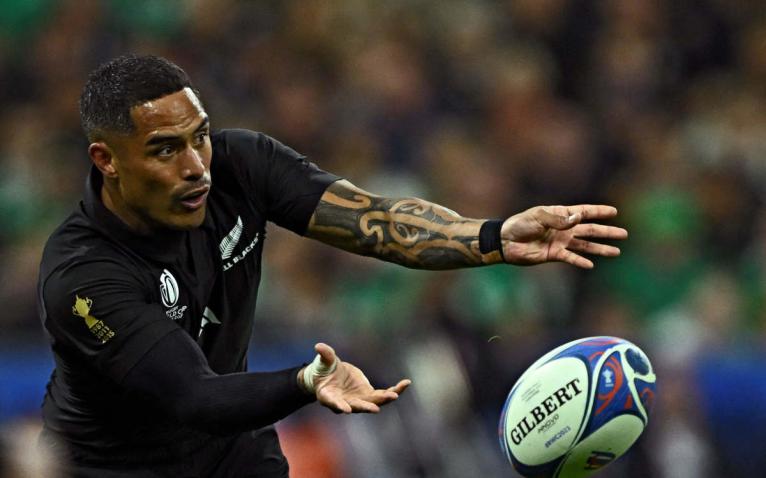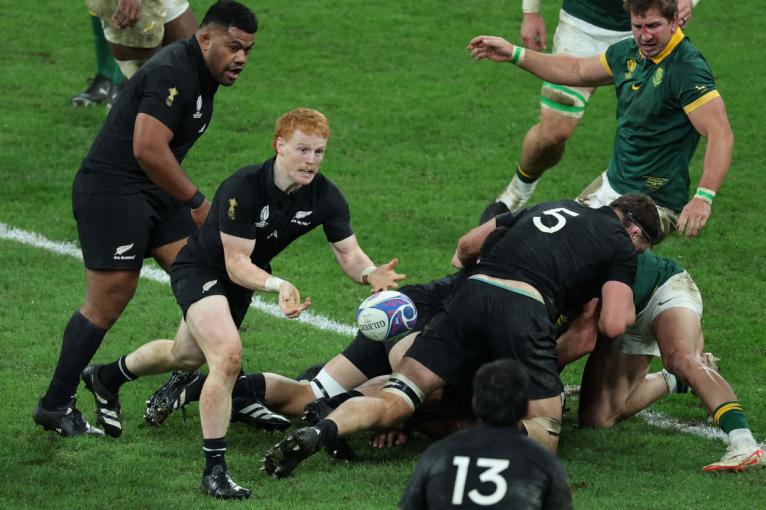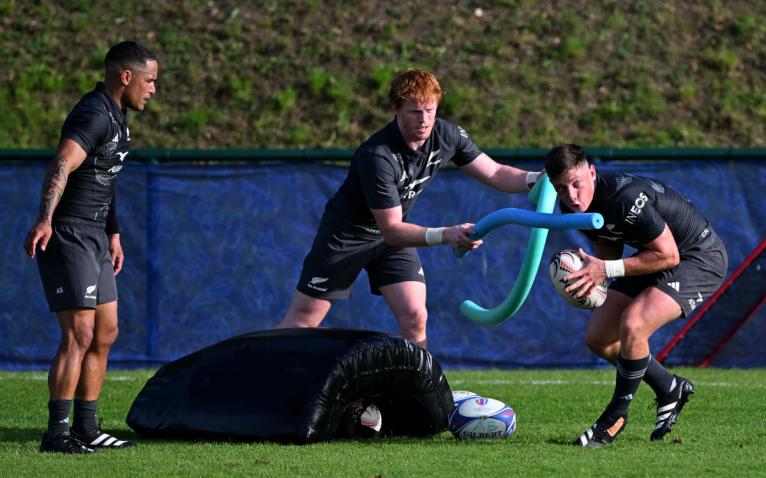Given the number of experienced World Cup All Blacks who are retiring from test rugby or making themselves unavailable by playing overseas, there is a sense of new coach Scott Robertson having to rebuild from ground zero.
But that’s not quite how things will be for the new coach. Of the 34 players the All Blacks used at the World Cup in France (including Ethan Blackadder, who replaced the injured Emoni Narawa), seven will definitely no longer be available in 2024.
There is one other – flanker Shannon Frizell (Brave Lupus) – who is heading to Japan but may yet still be available if he only commits to playing one season there. If he does, then it will mean that Robertson will be losing 20 per cent of the World Cup squad.
This may sound a significant number, but it is about in line with the numbers at the end of the last three World Cups. While there are some big names departing, legends of the game even, in most positions there are ready-made replacements identified.

Tight-head Laulala, 32, was the best out and out scrummager in the World Cup squad – maybe one of the best in the world – but was effectively ranked behind the younger Tyrel Lomax and Fletcher Newell once Lomax returned to fitness, and only picked on the bench for the final with the specific one-off job of nullifying South Africa’s ‘Bomb Squad’ loose-head Ox Nche.
With Lomax, Fletcher, Ethan de Groot and Tamaiti Williams, the All Blacks have four young, dynamic props in their midst – all of whom should be world-class operators long before the 2027 World Cup.
Losing the experience of Whitelock and Retallick is probably not going to be as dramatic as it seems either. Scott Barrett was already deemed the best lock in the country, and with Tupou Vai’i, Josh Lord and Patrick Tuipulotu all capped and contracted, there are good options for Robertson to work with.
At 32, Barrett still has plenty of rugby left in him and with his ability to play both first-five and full-back, he’ll be a wise head to have in the squad – mentoring McKenzie and Will Jordan.
Mo’unga is a major loss as it takes time to build a test No 10, but Robertson at least has an obvious candidate in Damian McKenzie with which to start his reign.
The little Chiefs maestro is an inexperienced fly-half, but he has won 47 test caps, mostly off the bench at full-back, and so at least is coming into the role with a good grasp of what the international game is all about.
At 32, Barrett still has plenty of rugby left in him and with his ability to play both first-five and full-back, he’ll be a wise head to have in the squad – mentoring McKenzie and Will Jordan.

Losing Fainga’anuku is frustrating, but there are ample other options on the wing and really, the only major void is going to come at half-back, where replacing Smith is going to be harder than many may realise.
Smith has been the All Blacks’ first-choice No 9 since 2012 and he revolutionised the game, or certainly the way New Zealand try to play it. After a decade or so of picking larger half-backs who operated more as auxiliary loose forwards, Steve Hansen came into the All Blacks head coaching role with a plan to find a smaller, more agile, mobile, passing scrum-half.
As Ian Foster, who was Hansen’s assistant in that period, would reveal in 2020: “We changed the shape of our nine to speed our game up.” Smith was picked to enable the All Blacks to play at a higher tempo, keep the ball in play for longer and to facilitate a straighter angle of attack.
Just how good he was is all too easy to under-appreciate, but Smith was sensational for 11 years. He was arguably the best scrum-half at the 2023 World Cup and the combination of his decision-making, tactical understanding and relentlessly accurate execution gave the All Blacks everything they hoped for when they first picked him.
Foster said Christie was the better defender and that’s what got him the nod, but it may also have been true that the selectors were concerned about the lack of accuracy in Roigard’s passing.
Roigard played well enough in his cameo appearances to convince everyone – other than the three people he needed to – that he should in fact have been on the bench for the three knock-out games, but he was overlooked for Fin Christie.
Foster said Christie was the better defender and that’s what got him the nod, but it may also have been true that the selectors were concerned about the lack of accuracy in Roigard’s passing.
Having earned a start against Namibia, Roigard was hugely influential in orchestrating the attack and working neatly in tandem with McKenzie, leading Foster to say: “He played really well, he had a pack that was giving a platform clearly, but he took his opportunities. It’s one thing to have good go-forward ball but he made really good decisions with that, and he should be really proud. We saw the benefit of his running game.”

Roigard was then picked again to start in the last pool game against Uruguay, with Foster saying: “I want to see him do what he is good at. He brings an edge to the running game, he’s a threat and I want him to stick with that.
Having highlighted the fault, Foster didn’t see any improvement and Roigard was put back on the shelf, as it were, as a work in progress for Robertson to develop. It’s an exciting project for Robertson, as Roigard, at 1.87m and 92kg, is a strong athlete with a bustling running game that damages defences.
If Roigard can learn the art of accurate passing, New Zealand will have a special player on their hands as he’s already shown a rare ability to score tries from short range and see space to play others into.

Maybe more significantly, if Roigard can be carefully nurtured, the All Blacks won’t be facing the extensive rebuild next year that some have suggested they are.
They will have four highly promising, young props, a portfolio of good locks, a back-row trio in Frizell (if they can get him back), Sam Cane and Ardie Savea to get them through next year at least, a midfield combination of Jordie Barrett and Rieko Ioane that could become as effective as the Ma’a Nonu-Conrad Smith combination of old, and a range of outside backs such as Mark Tele’a, Will Jordan, Caleb Clarke, Narawa and Beauden Barrett.


You haven't heard of Folau Fakatava?
A few inaccuracies here:
Roigard’s rookie season was 2021, not 2023.
I'd be very surprised if he was 1.87m. He's listed as 1.83m.
No no no! First, Smith was a wonderful player and passer, but Foster is kidding himself if he thinks he utilized him well to ‘speed up our game’ it speaks volumes for why he never succeeded as a coach. Aaron was class around the park - especially what he showed how he could cover D in the WC Finals - but he largely went backwards as a threat (thanks to the game plan). Not just that but, Foster Era especially, the backline could still not play with the ball in the face of rush d, and the 10 (or running forwards) was never made to run onto his accurate pass and put pressure on the line. Invariably the backline was made to be deep and static. It was actually their achillies heal I believe.
Roigard has the ability to be everything Smith wasn’t allowed to be by Fosters narrow vision, sending him to passing school is going to ruin him like Smith was. He will just not have the same X-Factor pass when he comes out, its never going to be a true strength but even now it is an adequate passing game. Smith could dart, he could play his forwards off him, encourage them to pick and go until he spotted his chance. Roigard has already shown himself to be at a similar level in those areas to where Aaron was at halfway through his career. Razor will not waste this opportunity to change up the game, and largely mimic how France benefit from Duponts abilities (another 9 who developed his own way).
Dmac is just the player to accommodate this style, and TJ Perinatal just the 9 to back up Cam. So the question is not how to replace him but how to change him, from the picture the previous regime saw into someone better. Something with real X-Factor.
Roigard looks quality.
And we are still very far away from Rieko and Jordie being as effective as Ma’a and Conrad — please!
BB - who said that Razor wants him back? His best years are definitely behind not ahead
He’ll be extremely difficult for the All Blacks to replace. His passing game was 2nd to none and his kicking game was pretty good too.
Smith's pass is like Tom Brady's; not the fastest, or longest but very accurate and easy to catch.
Oh and Barrett and Rieko becoming as effective as Smith and No'nu? Possibly the greatest centre pairing of all time?
Noah Hotham… watch this space
Yes I like him. I think there are some really good halves coming through. As well as loosies and watch out for Fabian Holland at lock.
He’s a gun player too I think it will be tj roigaurd and someone else